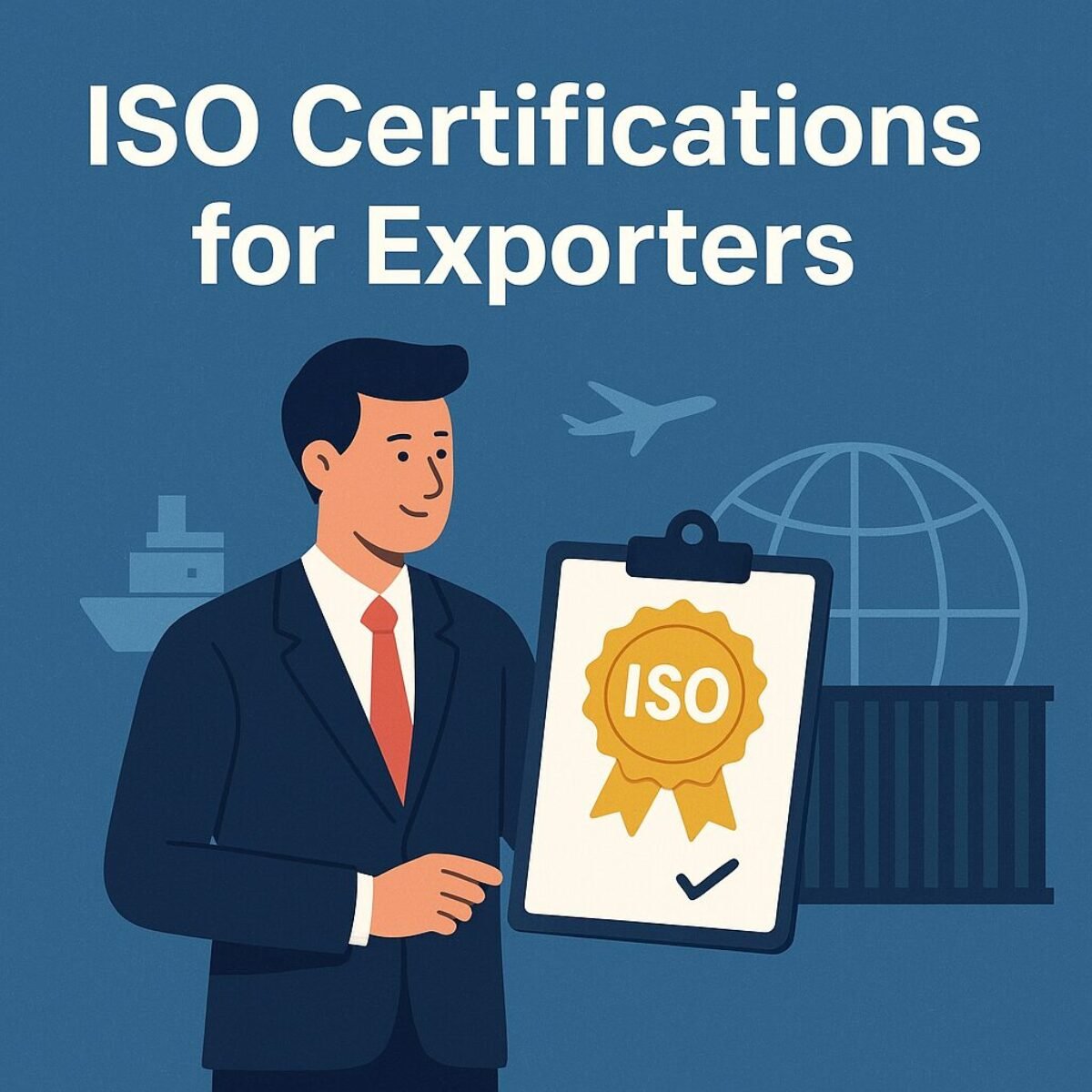
ISO Certifications for Exporters: A Complete Guide
Global trade is evolving faster than ever. Exporters are no longer competing only on price and product availability. Today, international buyers look for credibility, compliance, and consistent quality. That’s where ISO Certifications for Exporters play a vital role.
For any business aiming to sell goods across borders, ISO certifications act as a trust badge that reassures buyers, regulators, and consumers that products and processes meet international standards. Whether you are exporting fresh produce, textiles, machinery, or IT services, ISO standards help you build confidence in global markets.
This blog will guide you through what ISO certifications mean for exporters, why they matter, the most common certifications required, and how to achieve them.
What is ISO and Why Does it Matter for Exporters?
ISO stands for the International Organization for Standardization, a non-governmental body that develops globally recognized standards for quality, safety, environmental practices, and more. These standards provide a framework for businesses to ensure consistency, compliance, and efficiency.
For exporters, ISO certifications can:
- Enhance credibility with international buyers.
- Simplify compliance with foreign regulations.
- Reduce risks of shipment rejections.
- Improve internal processes and reduce waste.
In short, ISO certifications are not just a compliance requirement—they’re a business growth tool.
Benefits of ISO Certifications for Exporters
- Global Market Access
Many countries and buyers prefer or mandate suppliers to have ISO-certified systems. Holding certifications reduces entry barriers and ensures smoother trade negotiations. - Improved Buyer Trust
Importers are often concerned about the quality of products sourced from overseas. ISO-certified exporters instantly build trust as the certification acts as independent verification of standards. - Regulatory Compliance
Exporting involves strict customs, safety, and quality rules. ISO certification helps align your operations with international regulations, lowering the chances of disputes or shipment delays. - Operational Efficiency
ISO standards promote process improvements, documentation, and risk management. Exporters can reduce production costs, waste, and errors, making their businesses more profitable. - Brand Value & Reputation
Certifications are a marketing advantage. Displaying ISO credentials in product packaging, websites, or trade documents signals professionalism and reliability.
Key ISO Certifications for Exporters
While there are hundreds of ISO standards, some certifications are particularly valuable for exporters.
1. ISO 9001: Quality Management System (QMS)
Perhaps the most recognized standard globally, ISO 9001 ensures that companies maintain consistent quality in products and services. For exporters, this certification proves your ability to meet customer and regulatory requirements.
2. ISO 14001: Environmental Management System
With sustainability becoming a global demand, ISO 14001 helps exporters demonstrate eco-friendly practices. It shows buyers that your company is committed to minimizing its environmental impact.
3. ISO 22000: Food Safety Management
For food and agricultural exporters, ISO 22000 is critical. It addresses food safety risks, hygiene practices, and supply chain traceability. This certification builds confidence among international food regulators and consumers.
4. ISO 45001: Occupational Health and Safety
Workplace safety is a key concern for international buyers who want to ensure ethical sourcing. ISO 45001 helps exporters showcase safe and healthy working conditions for employees.
5. ISO 27001: Information Security Management
Exporters dealing with data-sensitive industries (like IT or technology) benefit from ISO 27001. It ensures your information security systems are robust and trustworthy.
6. ISO 50001: Energy Management System
This certification highlights energy-efficient practices. Exporters can appeal to environmentally conscious buyers by reducing their carbon footprint.
How Exporters Can Get ISO Certified
Getting ISO certified involves several steps, but it’s achievable with proper planning:
- Identify Relevant ISO Standard
Not all certifications apply to every business. Choose the standards most relevant to your product category and target markets. - Gap Analysis
Assess your current practices against ISO requirements. Identify gaps that need improvement. - Training & Implementation
Train employees on ISO procedures. Implement necessary changes in documentation, processes, or safety protocols. - Internal Audit
Conduct internal checks to ensure compliance before inviting external auditors. - Certification Audit
Hire an accredited certification body to conduct the audit. If successful, you’ll be awarded the certification. - Maintain Compliance
ISO certifications require ongoing monitoring and periodic renewals. Continuous improvement is part of the standard.
Challenges Exporters Face Without ISO Certification
- Difficulty gaining trust from foreign buyers.
- Limited access to high-value markets (like EU, US, Japan).
- Increased risk of product rejection at customs.
- Missed opportunities for contracts where certification is mandatory.
- Lack of structured processes leading to inefficiencies.
These challenges highlight why investing in ISO Certifications for Exporters is not an expense, but an asset for long-term growth.
Practical Tips for Exporters Considering ISO Certification
- Start Small: If budget is limited, begin with ISO 9001. It is widely recognized and opens many doors.
- Work with Experts: Hire consultants or advisors who specialize in ISO standards for exporters.
- Leverage Certification in Marketing: Highlight your ISO credentials on packaging, websites, and trade fairs.
- Integrate with Trade Policies: Align ISO certifications with local export council guidelines or free trade agreements.
- Plan for Long Term: Certification is not just about passing audits—it’s about embedding quality into your culture.
Final Thoughts
In today’s competitive trade environment, exporters must look beyond product pricing and availability. Building credibility and compliance is equally important. ISO standards for global exporters serve as a global passport, helping businesses access new markets, earn trust, and operate efficiently.
Whether you are exporting food, textiles, machinery, or digital services, ISO certifications not only make your business more reliable but also more sustainable and profitable.
Investing in these certifications is investing in your global future.









